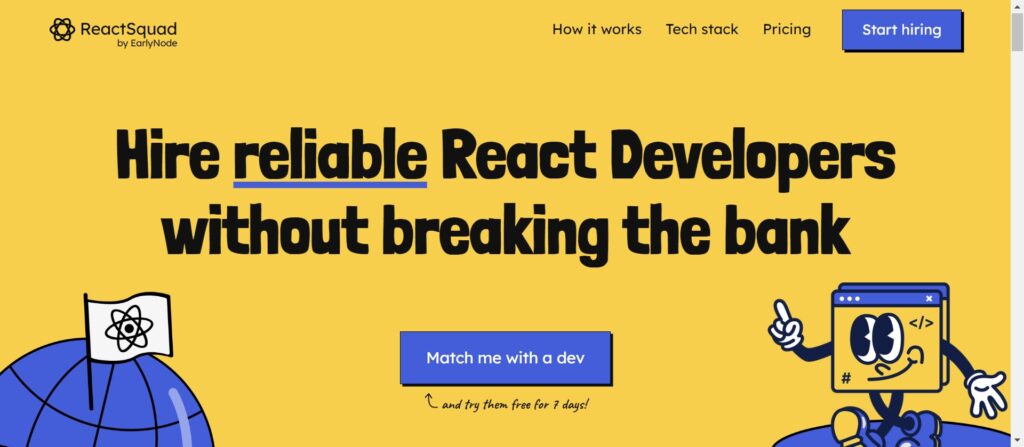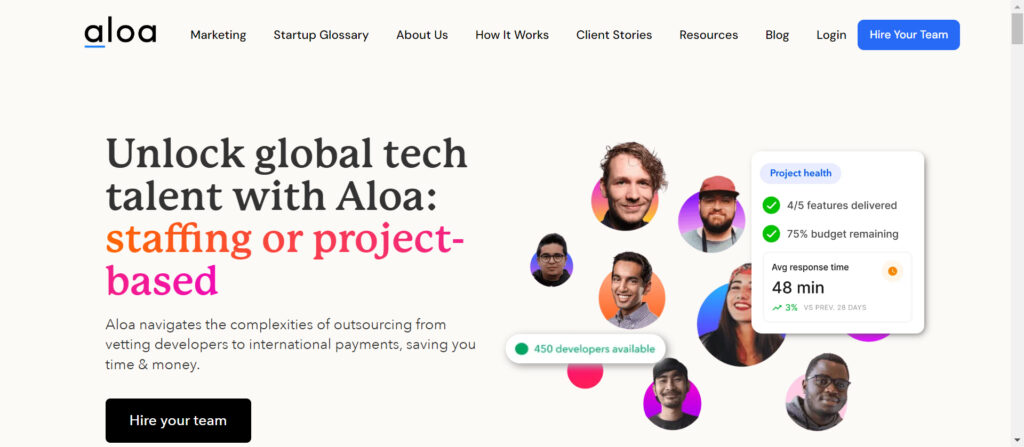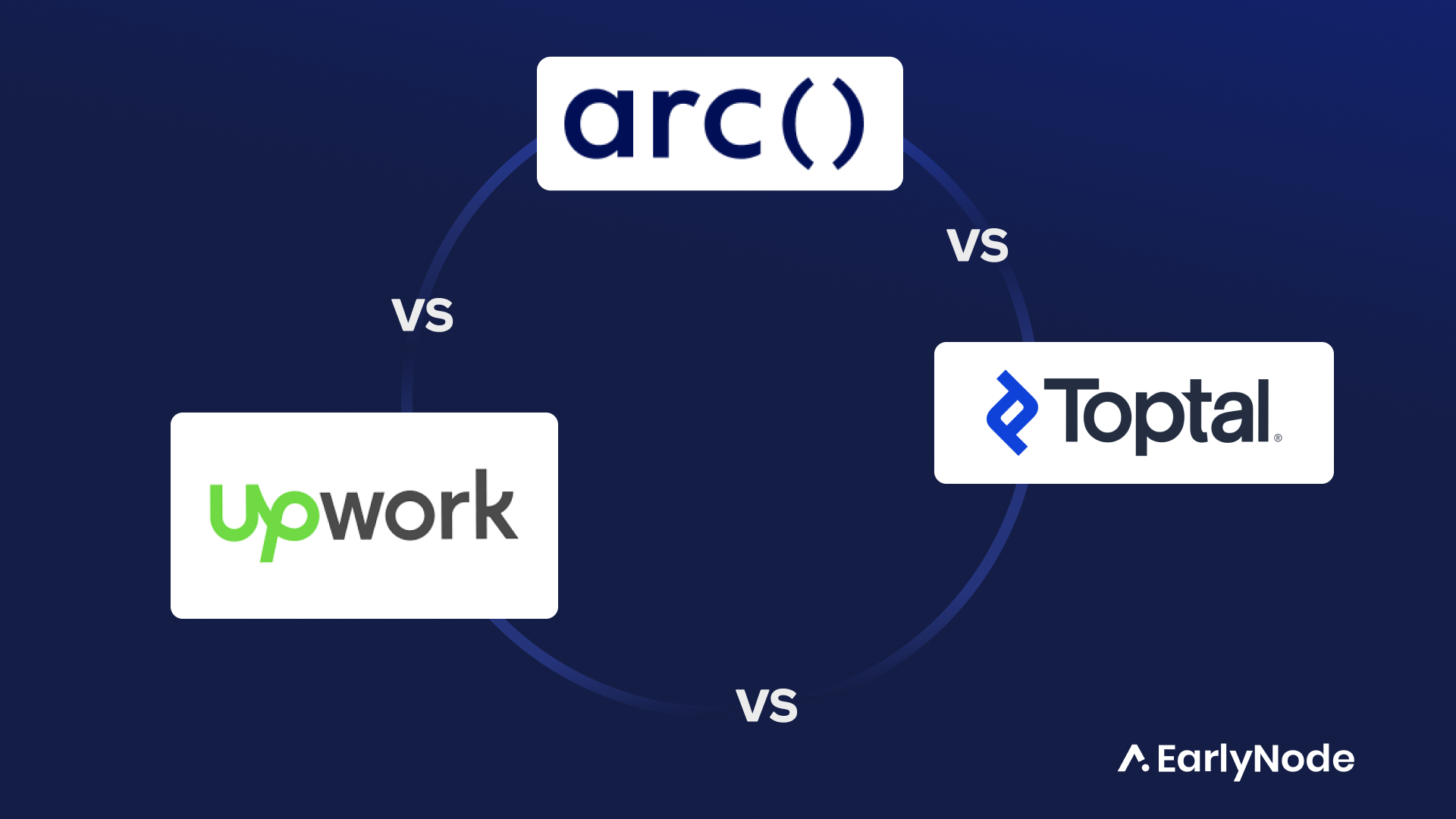What is the best IT Outsourcing Service?

TL;DR
- With IT outsourcing, the whole project is handled by the agency and handed over after completion.
- Staff augmentation involves “temporarily hiring” extra staff to join your existing team.
- Outsourcing gives you access to expertise while saving costs and improving efficiency.
- ReactSquad and Aloa are two solutions for IT outsourcing.
- ReactSquad gets you access to vetted experts at half the price of US-based developers.
Imagine you’re halfway through building your groundbreaking app, but your development team hits a roadblock. Should you outsource some tasks or beef up your team?
This article cracks the code, helping you decide between outsourcing and staff augmentation. Then, we’ll assess and compare two platforms to help you get started on your decision.
How is IT outsourcing different from staff augmentation?
Outsourcing and staff augmentation are two terms that are often confused.
Here’s the difference:
Think of IT outsourcing as hiring a freelancer agency: You hand them the entire app blueprint – design, coding, testing—the whole show. They work independently, deliver the finished product at an agreed time, and pay a set fee.
Staff augmentation is like hiring temporary teammates: You hire specific developers (like a front-end coder) to work alongside your existing team. They become part of your virtual office, collaborating on assigned tasks.
The benefits of IT outsourcing
Here are the main benefits of IT outsourcing for startups:
Cost Savings: Outsourcing IT tasks can be cheaper than building an in-house team. You won’t have expenses like salaries, benefits, office space, and equipment for extra staff. Plus, outsourcing agencies from overseas can offer competitive rates.
Access to Expertise: You can tap into a global pool of IT professionals with specialized skills that might be hard to find locally. This lets you get the best talent for the job, even if it’s outside your immediate location.
Focus on Core Activities: Outsourcing non-core IT functions can free up time and resources to focus on what you do best – developing your product and growing your business.
Scalability: Outsourcing allows you to scale your IT resources up or down as your needs change. This is helpful for growing startups that may not have a clear picture of their long-term IT needs.
Improved Efficiency: Reputable outsourcing providers have experience streamlining processes and delivering projects. This can help your startup get things done faster and avoid costly delays.
Around-the-Clock Support: Some outsourcing companies offer 24/7 support, which can be a lifesaver for startups operating in a global market.
Easy management: They handle their team, and you focus on yours.
How much does it cost to outsource IT services?
The simple answer is it depends. It’s difficult to give a one-size-fits-all answer. Here’s a breakdown of some key factors:
Engagement model
Fixed Fee: A set price for a specific project. Good for startups with clear needs and budgets.
Hourly Rate: You pay for the time the IT staff spends working on your project. It offers flexibility but can be unpredictable.
Retainer Model: A monthly fee for a set number of IT support hours. Provides more predictable costs but limits flexibility.
Service complexity
Complex projects requiring specialized skills will cost more than basic tasks.
Team location
Outsourcing to developers in countries with lower living costs can be cheaper. However, there might be trade-offs in communication or time zone differences.
Vendor experience
More experienced agencies charge higher rates but might offer better quality and efficiency.
Here are some ballpark figures to give you a general idea:
- Managed IT services: $125 – $250 per user per month (common for ongoing support)
- Project-based development: $1000 – $50,000 per month per contractor (can vary based on skills and location)
- Hourly rates: $75 – $200+ per hour (depending on expertise)
Best IT outsourcing services for US startups
ReactSquad

For software projects that require React.JS, ReactSquad is the ideal solution. This agency handles React projects of all sizes. It also provides expert developers to help fast-growing startups scale quickly.
Here are a few benefits of outsourcing to ReactSquad:
- Time zone overlap with US and EU time zones
- Transparent pricing. Rates start from just $75/hour
- Flexible payment structure; pay upfront or monthly
- 7-day free trial with no-risk replacement guarantees
- Qualified and trained engineers at half the price of US-based developers
- Get matched with a developer and start shipping code in less than a week.
Aloa

Aloa is a US-based outsourcing company that connects software development projects to developer agencies. According to its website, Aloa doesn’t actually develop software but provides tools to improve the outsourcing process.
With Aloa, you get:
- Access to vetted staff
- Time zone sync
- No foreign transaction fees
- Access to many tech stacks
Aloa vs ReactSquad: Which is better?
Price
ReactSquad’s transparent fees start at just $75 an hour. Aloa’s partners’ starting fees are between $60 and $90 hourly, depending on the technology and location.
Free trial
ReactSquad offers a 7-day no-risk free trial. If you’re unsatisfied with the developer, they will replace them or issue you a refund. Aloa doesn’t offer a free trial because they guarantee the best developers for your project.
Click to get started with ReactSquad and with a zero-risk free trial today!
Tech stack

ReactSquad’s tech stack: React, Redux, Remix, TypeScript, TailwindCSS, Node.js, JavaScript, Next.js,.
Aloa’s partner tech stack: Angular, Laravel, Android, Java, .NET, Drupal, Python, etc.
Skill/Experience level of developers
ReactSquad’s developers have at least 6 years of experience. Since Aloa doesn’t have a talent pool, it is difficult to gauge the experience and skill level of its partners’ developers.
When do you need an IT outsourcing service?
There are several signs that your startup might enjoy outsourcing IT services:
Limited IT Resources: You simply don’t have the in-house expertise or manpower to handle all your IT needs.
Need for Specialized Skills: Your project requires specific IT skills not currently available within your team, such as ReactJS. Outsourcing allows you to access a wider talent pool and find the perfect fit for the job.
Rapid Growth: Your startup is experiencing fast growth, and your IT infrastructure needs to scale quickly to keep up. Outsourcing can meet these growing demands without having to build a large internal IT team.
Focus on Core Business: You and your team want to focus on developing your core product and expanding your business. Outsourcing IT tasks frees up time and resources to concentrate on these critical areas.
Cost Reduction: Budget is a major concern for most startups. Outsourcing can be a cost-effective way to get the IT support you need without breaking the bank.
Around-the-Clock Support: Your business operates in a global market or requires 24/7 IT support. Outsourced partners in different time zones can provide this extended coverage.
Security Concerns: You lack the in-house expertise to secure your data and systems. Reputable outsourcing agencies can offer advanced cybersecurity solutions to protect your startup.
These factors can help you decide if IT outsourcing is the right move for your startup. It’s not a one-size-fits-all solution, but it is great for startups who want to stay cost-effective.
How to choose the right IT outsourcing service
We’ve provided a roadmap to help you decide what outsourcing partner is right for you:
- Define your needs
Identify the specific IT tasks you want to outsource (e.g., React development, cybersecurity). Choose the level of expertise and define the project duration. Then, set a realistic budget for outsourcing costs.
- Research potential partners
Look for outsourcing companies with experience in your industry and tech stack. Check out online reviews, case studies, and client testimonials. In fact, you’re doing that right now by reading this article.
Verify their references and contact past clients for their experience. For example, you can contact past client companies on LinkedIn. Your network is also a good source of referrals.
3. Test expertise and experience
Review the agency’s team qualifications and certifications. Ask about their project management and communication style. Ensure they understand your specific needs and can adapt their approach. Consider a trial project to assess their skills and work style before a larger commitment. It’s also a good idea to check the company’s reputation and financial stability.
4. Consider cultural fit and communication style
Time zone differences and cultural barriers can impact collaboration. Test your partner’s English language level and communication methods. Look for a partner who values clear communication and transparency.
5. Data security and compliance
Breaking data laws can be costly. Investigate their data security measures and compliance with relevant regulations. Do they have secure data storage practices and disaster recovery protocols? How do they handle non-disclosure agreements (NDAs) to protect your intellectual property?
6. Get quotes and proposals
Request detailed quotes outlining project scope, timelines, costs, and payment terms. The proposal should address your specific needs and requirements. Compare proposals from many providers to find the best value for your budget.
7. Negotiate the contract
Define the scope of work, deliverables, timelines, and payment terms. Set your communication protocols, dispute resolution policy, and termination clauses. Then, sign the contract. The contract must protect your intellectual property rights and data security.
Conclusion
There you have it. We promised to crack the code and deliver a complete comparison guide. Aloa and ReactSquad are two excellent options with unique strengths, features, and benefits. With the factors and tips we’ve shared, you can now make the best decision to scale and grow your startup.




